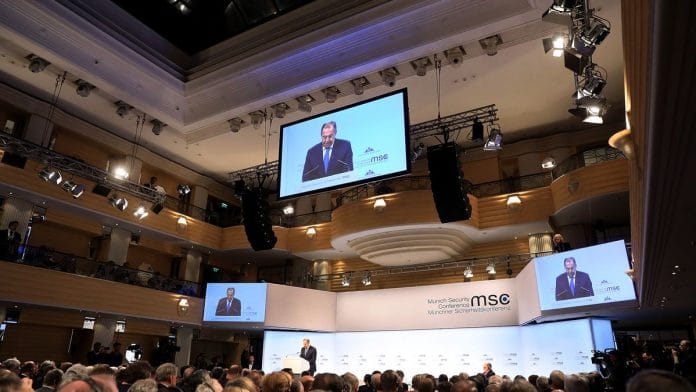This year’s Munich Security Conference, the world’s most significant global security policy meeting, has an unnerving agenda, titled, “Who will pick up the pieces?”
The “pieces” in the title refer to the crumbling blocks of the liberal international order.
The very world order, which was created by the US in the post-war era, is now being dismantled by Donald Trump’s presidency, a rising China, and growing power competition among Russia, China, and the US.
The conference’s agenda report states that in addition to unfolding big-power competition, a leadership vacuum is emerging in the international liberal order. In a frightening observation, the report says, “It is becoming obvious that new management tools are needed to prevent a situation in which not much may be left to pick up.”
Imperiled liberal international order
Since 1963, the Munich Security Conference has been an integral annual platform for the transatlantic alliance — where member states come to discuss strategies and pledge their allegiance to “mutual security”.
Formed after the Second World War, the transatlantic alliance is the coalition of western democracies including Western European countries, the US, and Canada. And in the context of the Cold War era, the transatlantic alliance stood in opposition to the communist-Soviet bloc.
In turn, this transatlantic alliance has been at the heart of the liberal international order.
The international liberal order is a set of international multilateral institutions, formed by the transatlantic nations to facilitate global economic and security cooperation.
And if the Munich Security Conference, the mecca of “transatlanticism”, is questioning the future sustainability of the liberal international order, we are indeed in the midst of massive global change and reconfiguration.
What is the Munich Security Conference?
Over the decades, the conference has been referred to by several names. It has been called an “unregulated marketplace for ideas”, “Oscars for security policy wonks”, and the “transatlantic family meeting”.
The Munich Security Conference was started in 1963 and back then it was called “Wehrkunde”, which is the German word for ‘military science’. As the word suggests, this meeting has been the platform for the most serious discussions on global security policy.
Originally, the objective of the conference was to host an annual summit where Germans discussed “mutual security” with their key ally, the US and other NATO members. Back then, mutual security meant security among transatlantic allies in the overarching Cold War framework.
With the end of the Cold War, other global powers such as Russia, China, India, and Brazil were also invited to participate.
What happens at this conference?
Every year various heads of state, ministers, high-ranking military officials, security policy elite, and other policymakers get together at Hotel Bayerischer Hof, in downtown Munich. And the conference features thoughtful debates among the participants “on the podium and behind the scenes”.
There are several reasons, which make the Munich Security Conference so unique and important.
First, for the good part of its history, the panel discussions were not telecast and the audience included only a few dozen people. During the time of Cold War, panel discussions on security policy and NATO were held in closed-door rooms.
This lack of transparency assured that most speakers spoke freely and a lot of discussions translated into diplomatic initiatives.
Even as recent as 2012, with US adopting its policy of “Rebalance towards Asia” — a lot of its European allies were concerned. The then secretary of state Hilary Clinton used this platform to reassure US’s European allies.
Second, discussions at Munich often go beyond discussing the response to the next crisis. Thus, it acts as a platform for discussing serious long-term strategies.
Third, because the venue is a tiny hotel, and everyone is crammed in together, a lot of leaders indulge in behind the scene informal discussions. Moreover, it has developed as a great venue for leaders with contentious relationships to meet informally and break some ice.
Lastly, Munich has also emerged as a site for a lot of serious Track-II dialogues and non-governmental initiatives. For instance, the Euro Atlantic Security Initiative and the Global Zero Commission were first discussed at Munich.
How has it changed over the years?
During the Cold War period, the objective was to discuss ‘Western’ strategy with respect to the Soviet Union and Warsaw Pact countries. In the post-Cold War era, while the central focus of the conference continues to be the transatlantic alliance, the discussions are much more wide-ranging, including topics such as terrorism, failed states, and cyber warfare.
Another change made at the Munich Security Conference, induction of transparency, is starting to raise doubts about the efficacy of the meet. Now all panel discussions are broadcast on TV and telecast on the organisation’s website. This has led to speakers censoring their speeches, and as a result the discussions are far less controversial.
Back to a Murky Global Order
The central theme of this year’s conference cannot be missed. Bringing the onus back to Trump, the report notes, “The challenge posed by China and Russia notwithstanding, it could be argued that the United States’ position in the world – and with it the global order the US has shaped — may be threatened more by the rise of populist politics at home than the rise of other powers abroad.”
Further Reading:
Towards Mutual Security – 50 Years of Munich Security Conference, StiftungMünchnerSicherheitskonferenz& Wolfgang Ischinger (ed.)
Munich Security Report 2019, Munich Security Conference






